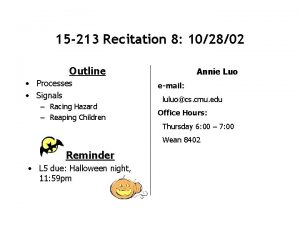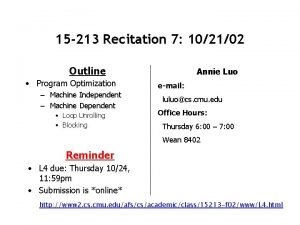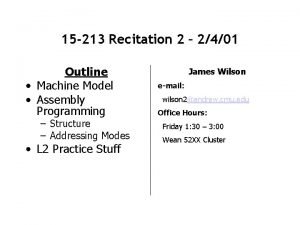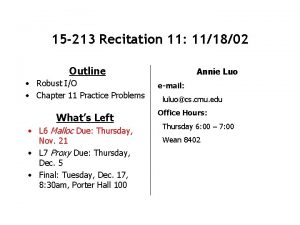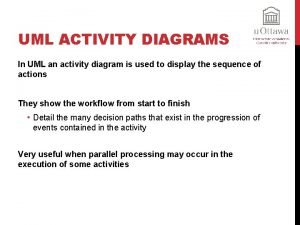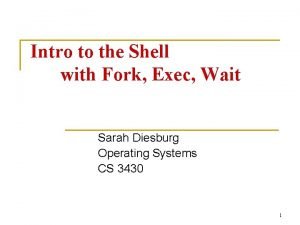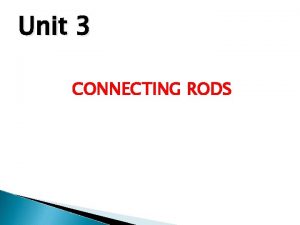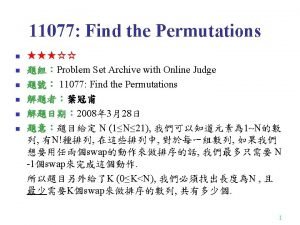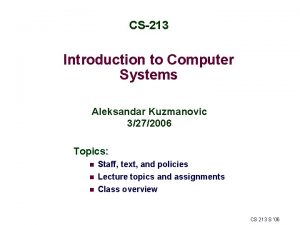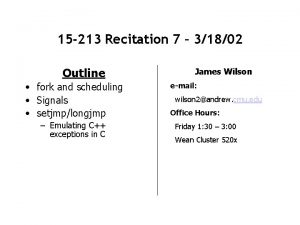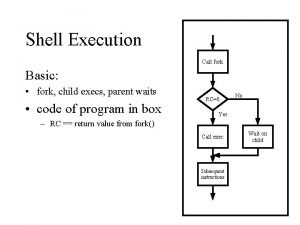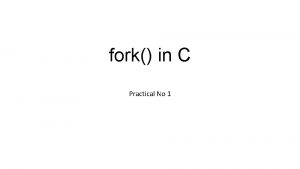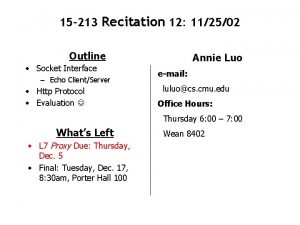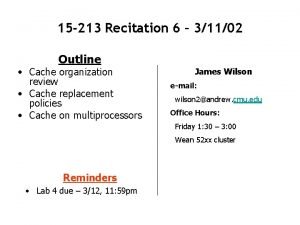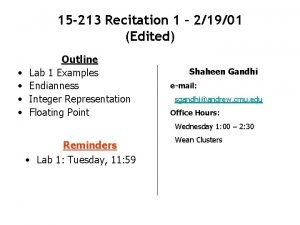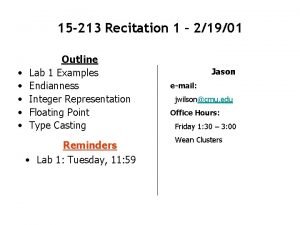15 213 Recitation 7 31802 Outline fork and

![What output does the following have? int main(int argc, char *argv[]) { int i What output does the following have? int main(int argc, char *argv[]) { int i](https://slidetodoc.com/presentation_image_h2/933aeecb1bb525a7a8330dd89aefc55a/image-2.jpg)

![What’s wrong with the code? int main(int argc, char *argv[]) { int i = What’s wrong with the code? int main(int argc, char *argv[]) { int i =](https://slidetodoc.com/presentation_image_h2/933aeecb1bb525a7a8330dd89aefc55a/image-4.jpg)
![Need to add wait() int main(int argc, char *argv[]) { int i = 0; Need to add wait() int main(int argc, char *argv[]) { int i = 0;](https://slidetodoc.com/presentation_image_h2/933aeecb1bb525a7a8330dd89aefc55a/image-5.jpg)








![Setjmp, Longjmp: Example con’t old %ebp env[8]. . . Then main( ) calls a( Setjmp, Longjmp: Example con’t old %ebp env[8]. . . Then main( ) calls a(](https://slidetodoc.com/presentation_image_h2/933aeecb1bb525a7a8330dd89aefc55a/image-14.jpg)
![Setjmp, Longjmp: Example con’t old %ebp env[8] Then main( ) calls a( ). …. Setjmp, Longjmp: Example con’t old %ebp env[8] Then main( ) calls a( ). ….](https://slidetodoc.com/presentation_image_h2/933aeecb1bb525a7a8330dd89aefc55a/image-15.jpg)
![Setjmp, Longjmp: Example con’t old %ebp env[8] …. env[0] Returned to main( ), and Setjmp, Longjmp: Example con’t old %ebp env[8] …. env[0] Returned to main( ), and](https://slidetodoc.com/presentation_image_h2/933aeecb1bb525a7a8330dd89aefc55a/image-16.jpg)
![Setjmp, Longjmp: Example con’t old %ebp env[8] …. env[0] s =? ? 3 longjmp( Setjmp, Longjmp: Example con’t old %ebp env[8] …. env[0] s =? ? 3 longjmp(](https://slidetodoc.com/presentation_image_h2/933aeecb1bb525a7a8330dd89aefc55a/image-17.jpg)






- Slides: 23

15 -213 Recitation 7 – 3/18/02 Outline • fork and scheduling • Signals • setjmp/longjmp – Emulating C++ exceptions in C James Wilson e-mail: wilson 2@andrew. cmu. edu Office Hours: Friday 1: 30 – 3: 00 Wean Cluster 520 x
![What output does the following have int mainint argc char argv int i What output does the following have? int main(int argc, char *argv[]) { int i](https://slidetodoc.com/presentation_image_h2/933aeecb1bb525a7a8330dd89aefc55a/image-2.jpg)
What output does the following have? int main(int argc, char *argv[]) { int i = 0; else { printf("%dn", i); } return 0; printf("%dn", i); if(fork()) { ++i; printf("%dn", i); } else { printf("%dn", i); } } }

Scheduling Dependent Output • Parents always first produces: – 0, 1, 2, 0, 1 • Lowest level child always first: – 0, 0, 1, 1, 2 • A good number more versions…
![Whats wrong with the code int mainint argc char argv int i What’s wrong with the code? int main(int argc, char *argv[]) { int i =](https://slidetodoc.com/presentation_image_h2/933aeecb1bb525a7a8330dd89aefc55a/image-4.jpg)
What’s wrong with the code? int main(int argc, char *argv[]) { int i = 0; else { printf("%dn", i); } return 0; printf("%dn", i); if(fork()) { ++i; printf("%dn", i); } else { printf("%dn", i); } } }
![Need to add wait int mainint argc char argv int i 0 Need to add wait() int main(int argc, char *argv[]) { int i = 0;](https://slidetodoc.com/presentation_image_h2/933aeecb1bb525a7a8330dd89aefc55a/image-5.jpg)
Need to add wait() int main(int argc, char *argv[]) { int i = 0; else { printf("%dn", i); } return 0; printf("%dn", i); if(fork()) { ++i; printf("%dn", i); wait(); } else { printf("%dn", i); } wait(); } }

Signals • Software events generated by OS and processes – an OS abstraction for exceptions and interrupts • Sent from the kernel or a process to other processes. • Different signals are identified by small integer ID’s • Only information in a signal is its ID and the fact that it arrived. Num. Name 2 SIGINT Default Description Terminate Interrupt from keyboard (cntl-c) Terminate Kill program (cannot override or ignore) 11 SIGSEGV Terminate & Dump Segmentation violation 14 SIGALRM 17 SIGCHLD Terminate Timer signal Ignore Child stopped or terminated 9 SIGKILL

Signals #include <stdio. h> #include <malloc. h> #include <signal. h> // Signal handler // Called when process receives signal // Just exits static void sig_handler ( int sig ) { printf( "Segmentation fault caught, exiting gracefully. n" ); exit ( 16 ); }

Signals int main() { float *f, t 1, t 2; signal ( SIGSEGV, sig_handler ); // set function to handle signals f = (float*) malloc ( 3 * sizeof ( float ) ); f[0] = 1; f[1] = 8; f[2] = 7; t 1 = *(f+0) + *(f+1); printf ( "%fn", t 1 ); } free ( f ); f = NULL; // set f to NULL t 2 = *(f+1) + *(f+2); printf ( "%f", t 2 ); return 0; // accessing it generates SIGSEGV // which is caught by process and // and calls handling function

Signals • Output without signal handling: • %. /signal • 9. 000000 • Segmentation fault • Output with signal handling: • %. /signal • 9. 000000 • Segmentation fault caught, exiting gracefully. • Provides programmer with method to clean up program (free all used blocks of memory, unlock mutex, etc. . ) if a kill signal is sent

Setjmp, Longjmp int setjmp(jmp_buf env); void longjmp(jmp_buf env, int val); Useful functions for dealing with errors and interrupts • setjmp saves its environment (i. e. registers) in env for later use by longjmp • After longjmp completes, program starts after call to setjmp, as if setjmp had returned val.

Setjmp, Longjmp: Example What is the output of the following program? #include <setjmp. h> #include <stdio. h> int a(char *s, jmp_buf env) { int i; i = setjmp(env); printf("Setjmp returned -- %dn", i); printf("s = %sn", s); int main() { jmp_buf env; if(a("Bob", env) != 0) exit(0); b(3, env); return i; } int b(int i, jmp_buf env) { printf("In b: i = %d, Calling longjmpn", i); longjmp(env, i); } return 0; }

Setjmp, Longjmp: Example con’t UNIX> sj Setjmp returned -- 0 s = Bob In b: I = 3, Calling longjmp Setjmp returned -- 3 s = Bob UNIX> sj Setjmp returned -- 0 s = Bob In b: I = 3, Calling longjmp Setjmp returned -- 3 Segmentation Fault

Setjmp, Longjmp: Example con’t Let’s take a look at the stack to see why we’re segfaulting. %ebp old %ebp First, main( ) looks like this. env[8]. . . env[0] %esp %eip --> in main
![Setjmp Longjmp Example cont old ebp env8 Then main calls a Setjmp, Longjmp: Example con’t old %ebp env[8]. . . Then main( ) calls a(](https://slidetodoc.com/presentation_image_h2/933aeecb1bb525a7a8330dd89aefc55a/image-14.jpg)
Setjmp, Longjmp: Example con’t old %ebp env[8]. . . Then main( ) calls a( ). env[0] s = “Bob” Rtn Addr %ebp old %ebp i %esp %eip --> in a
![Setjmp Longjmp Example cont old ebp env8 Then main calls a Setjmp, Longjmp: Example con’t old %ebp env[8] Then main( ) calls a( ). ….](https://slidetodoc.com/presentation_image_h2/933aeecb1bb525a7a8330dd89aefc55a/image-15.jpg)
Setjmp, Longjmp: Example con’t old %ebp env[8] Then main( ) calls a( ). …. env[0] s = “Bob” Rtn Addr %ebp old %ebp i %esp %eip --> in a Then a( ) calls setjmp( ). This saves the current state of the registers.
![Setjmp Longjmp Example cont old ebp env8 env0 Returned to main and Setjmp, Longjmp: Example con’t old %ebp env[8] …. env[0] Returned to main( ), and](https://slidetodoc.com/presentation_image_h2/933aeecb1bb525a7a8330dd89aefc55a/image-16.jpg)
Setjmp, Longjmp: Example con’t old %ebp env[8] …. env[0] Returned to main( ), and main( ) calls b( ). i = 3 Rtn Addr %ebp old %ebp %esp i %eip --> in b
![Setjmp Longjmp Example cont old ebp env8 env0 s 3 longjmp Setjmp, Longjmp: Example con’t old %ebp env[8] …. env[0] s =? ? 3 longjmp(](https://slidetodoc.com/presentation_image_h2/933aeecb1bb525a7a8330dd89aefc55a/image-17.jpg)
Setjmp, Longjmp: Example con’t old %ebp env[8] …. env[0] s =? ? 3 longjmp( ) is called, and the regs are restored to their values of when a( ) was called. Rtn Addr %ebp old %ebp %esp i %eip --> in a Why the segfault? ? --> the stack is in a bad state. a( ) expects a (char *) instead of the int value 3. This a common bug with setjmp/longjmp ---> You CANNOT return from a function that calls setjmp!

C++ exception handling introduction • A more general and powerful error handling mechanism than return values • Simplified syntax: class A { }; try { do_something(); } catch (const A&) { // handle exception A } • The function do_something can throw/raise exceptions with: throw A();

C++ exception handling introduction • Exceptions can be arbitrary types in C++, including objects with constructors • C++ allows for nested try blocks; exceptions that are uncaught at one level percolate up to the next – Uncaught exceptions terminate the program, but this behavior can be changed • The full syntax and semantics, like most of C++, is complicated – Read Stroustrup, chapter 14

Emulating exception handling in C • setjmp/longjmp mechanism allows for some limited emulation of C++ exceptions • Use setjmp to set up a try block and the exception handlers • Exceptions are thrown using longjmp with an appropriate exception code

C++ exception handling example #include <stdio. h> #include <math. h> #include <unistd. h> class Range { }; class Close { }; void sqrt_loop(void) { double d; printf("Enter a number between 0 and 100: "); if (scanf("%lf", &d) == EOF) throw Close(); if (d<0 || d>100) throw Range(); printf("Square root of %f is %fn", d, sqrt(d)); } int main(void) { try { while(1) sqrt_loop(); } catch (const Range &) { fprintf(stderr, "Number out of rangen"); exit(0); } catch (. . . ) { fprintf(stderr, "Uncaught exceptionn"); exit(1); } return 0; }

Emulating exception handling in C example #include <setjmp. h> <stdio. h> <math. h> <unistd. h> int main(void) { int ex_no; switch (ex_no = setjmp(ex_buf)) { case 0: while(1) sqrt_loop(); break; case EX_RANGE: fprintf(stderr, "Number out of rangen"); exit(0); default: fprintf(stderr, "Uncaught exception %dn", ex_no); exit(ex_no); } return 0; jmp_buf ex_buf; #define EX_RANGE 1 #define EX_CLOSE 2 void sqrt_loop(void) { double d; printf("Enter a number between 0 and 100: "); if (scanf("%lf", &d) == EOF) longjmp(ex_buf, EX_CLOSE); if (d<0 || d>100) longjmp(ex_buf, EX_RANGE); printf("Square root of %f is %fn", d, sqrt(d)); } }

Limitations • We can only throw an integer error code to the exception catcher. C++ allows arbitrary objects to be thrown – You can create a pointer for an “exception object, ” but this is not type-safe and allocation/disposal is not automatic • Need a stack of jmp_buf structures to emulate an exception stack – Otherwise, storing and restoring the exception jmp_buf gets messy – Uncaught exceptions are not automatically rethrown • Even with a stack, the above implementation is not thread-safe – Each thread needs a separate exception stack
 Sigchild
Sigchild Outline 213
Outline 213 Outline 213
Outline 213 Outline 213
Outline 213 Active recitation
Active recitation Quood recitation
Quood recitation Rote recitation of a written message
Rote recitation of a written message Learning objectives for poem
Learning objectives for poem Reciting a poem
Reciting a poem What is meant by etiquette of recitation of the holy quran
What is meant by etiquette of recitation of the holy quran Xvvvxv
Xvvvxv Product-oriented rubric sample
Product-oriented rubric sample Rcitation
Rcitation Citation sandwich example
Citation sandwich example Uml activity diagram
Uml activity diagram Fork exec wait in c
Fork exec wait in c Se 555
Se 555 Marine type connecting rod
Marine type connecting rod Fork() wait() exec() and exit() system calls
Fork() wait() exec() and exit() system calls Connecting rod definition
Connecting rod definition 123+132+321+312
123+132+321+312 Sbi 213
Sbi 213 Northwestern cs 213
Northwestern cs 213 Cow.ceng.metu.edu tr
Cow.ceng.metu.edu tr
